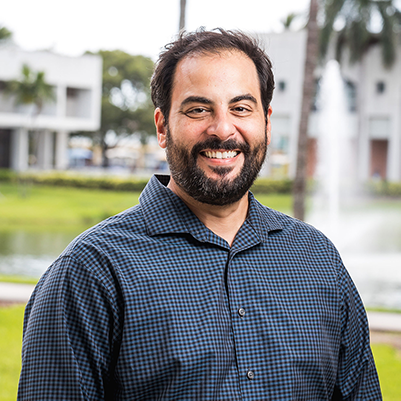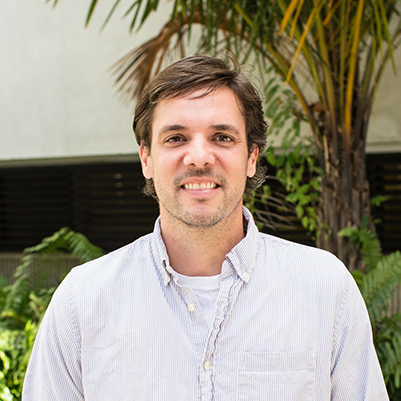Hurricanes can leave a lasting — and sometimes traumatic — impact on a child’s developing brain.
FIU researchers are investigating the effects of hurricanes and other natural disasters on brain development in children. For the first time ever, researchers are able to look on a large scale at both neurobiological and clinical information obtained before and after a hurricane makes landfall.
New research reveals that when a child is exposed to excessive pre-storm media coverage of a major climate event, like a hurricane, it can lead to post-traumatic stress (PTS) symptoms — even in children that live thousands of miles away from the storm’s path.
Using data from the Adolescent Brain Cognitive Development Study (ABDC) — the largest long-term study of brain development and child health in the United States — FIU psychologists Jonathan Comer and Anthony Dick are comparing child brain function before and after Hurricane Irma — one of the extremely powerful and devastating storms in recent years — with the intention of studying children’s response to disasters more generally. They examined pre-and post-hurricane brain function, mood and thinking of 450 children — and found a connection between exposure to television and online news consumed before the storm’s landfall and the later development of PTS symptoms.
Media exposure can impact children — regardless of proximity to the disaster. Even children living thousands of miles away from the storm’s project path experienced mental health consequences.
Resources
- Browse all resources
- Paper | Neutral vulnerability and hurricane-related media are associated with post-traumatic stress in youth
- Browse photos
- Browse videos
Experts

Anthony Steven Dick, Ph.D.
Professor of Psychology
Center for Children and Families
Dick is a developmental cognitive neuroscientist who studies the neurobiology of language and executive function using diffusion-weighted and functional imaging. He is specifically interested in how these cognitive processes are mutually supported by developing structural and functional neural networks, in both typically developing and atypically developing children (e.g., children with ADHD, pediatric stroke). In 2018 he edited a graduate developmental science text (Dick & Müller, Eds., Advancing Developmental Science; Philosophy, Theory, and Method). He has been funded by the NIDCD, NICHD, NIMH, NIDA, NIDDK and NSF to conduct his work.

Jonathan S. Comer, Ph.D.
Professor of Psychology and Psychiatry
Center for Children and Families
Comer has conducted extensive research on the psychological impact of terrorism and other traumatic events or disasters on youth, including the Boston Marathon bombing and the September 11 attacks. As Director of the Mental Health Interventions and Technology Program at FIU’s Center for Children and Families, his research focuses on expanding the quality, scope and accessibility of mental health care for youth. Much of his work examines children’s media-based exposure to traumatic events and how caregivers can best discuss frightening world events with their children.

Raul Gonzalez, Ph.D.
Chair, Department of Psychology
Professor of Psychology, Psychiatry and Immunology
Center for Children and Families
Through his research, Gonzalez aims to identify neurocognitive differences that may place individuals at risk for substance use disorders or that emerge from their use. He has approximately 20 years of experience conducting research on neurocognitive contributors and consequences of substance use and addiction, with a focus on cannabis. He is currently the site co-principal investigator of the Adolescent Brain Cognitive Development study that enrolls 11,000+ healthy children and follow them from age 9-10 into early adulthood in order to better understand biological and environmental contributors healthy development, including risk factors and consequences for substance use disorders. Dr. Gonzalez is a licensed clinical psychologist in the state of Florida and has substantial experience conducting neuropsychological evaluations in English and Spanish.

Matthew T. Sutherland, Ph.D.
Associate Professor of Psychology
Center for Children and Families, Center for Imaging Science
Sutherland has a broad background in cognitive neuroscience and specific training in drug abuse. Sutherland’s research focuses on understanding the impact of drug abuse on human brain function. Specifically, his research aims to understand the brain mechanisms that contribute to continued drug use with specific emphasis on nicotine addiction, marijuana use, and attentional process. Towards this goal, Sutherland’s research employs multiple neuroimaging tools (e.g., pharmacological, task-based and ‘resting-state’ functional magnetic resonance imaging (fMRI), simultaneous EEG/fMRI) to identify potential biomarkers for diagnosis and tracking of disease progression, new targets for therapeutic interventions, and strategies for expediting the implementation of personalized treatment.

Angela R. Laird, Ph.D.
Director, Center for Imaging Sciences
Professor of Physics
Laird was trained as an imaging physicist but has evolved into a cognitive neuroscientist who aims to understand the functional organization of the human brain. Dr. Laird’s research uses functional magnetic resonance imaging (fMRI) to understand the organization of large-scale networks in the human brain. She is the director of the Neuroinformatics and Brain Connectivity (NBC) Lab, which focuses on developing novel data analysis algorithms, neuroscience informatics tools, and neuroimaging ontologies to yield analytic strategies for improving investigations into functional brain networks. Her current projects are examining changes associated with adolescent development, undergraduate science education, and addiction. She is also the site co-principal investigator of the Adolescent Brain Cognitive Development study – the largest long-term study of brain development and child health in the United States.
Photos
Please credit Florida International University for photos and videos unless otherwise noted.
Contact Us
Christine Fernandez
Senior Account Manager
305-348-9987
chcalvo@fiu.edu
CASE 456Nathalie Medina
Junior Account Manager
305-348-7678
nmedina@fiu.edu
CASE 456

